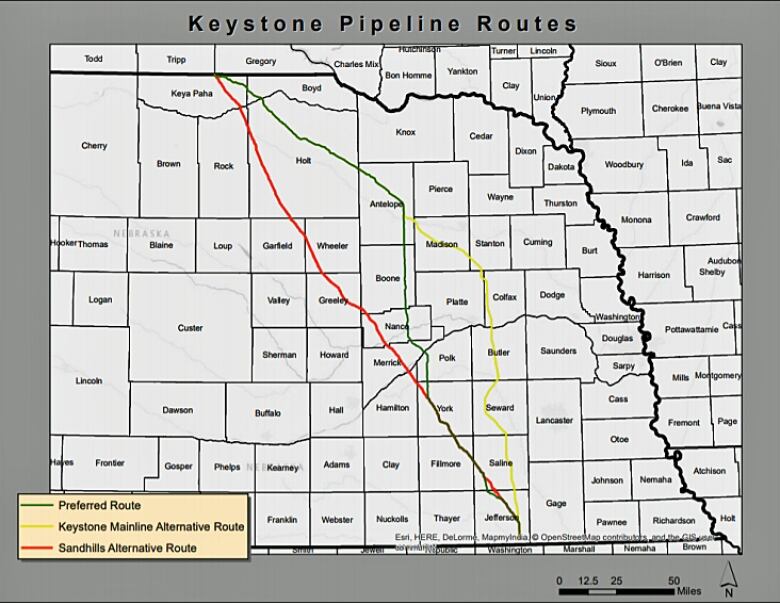Nebraska regulator who voted against new Keystone XL route says residents aren't getting 'a fair shake'

Crystal Rhoades says there is "very little information available" about a pipeline route approved Monday to link Canadian oilsands to U.S. refineries.
TransCanada Corp.'s Keystone XL won approval Monday from regulators in Nebraska, the last state to approve the pipeline.
But in an unexpected twist, state regulators did not OK the company's preferred route.
- Energy industry cautiously optimistic about Keystone
- Notley 'very pleased' with Keystone XL approval
Instead, the state's five-member Public Service Commission voted 3-2 in favour of the so-called "mainline alternative route," which would see the pipeline run eight kilometres longer and slightly farther northeast than planned.
Rhoades, one of the two dissenting commissioners, said with a new route comes new problems.
She spoke with As It Happens host Carol Off about why she voted against approval. Here's what she had to say.
Where did the idea of the alternative route come from?
[TransCanada] was required to submit an alternative route as part of the Major Oil Pipelines Siting Act. They were required to demonstrate that they had looked at other routes and that they were proposing the route that, in their view, was the best route.
I don't believe that they ever intended for the commission to consider it. There certainly was very little or almost no evidence presented related to that "mainline alternative route," so I do think people are a little stunned and very confused about what happened today.

Can you give us some sense of how the commission came to decide that ... we'll approve it but we're going to give you this alternate route that you don't really want?
I really can't speak to what was in the minds and hearts of my fellow commissioners, I'm sorry.
Well, what was in your mind and heart?
I was very concerned that approving this mainline alternative route was going to violate the due process of the landowners. If they don't know what's happening or what might happen to them, there's no way for them to exercise their due process rights and join the other landowners and have their case heard in front of the commission.
And I was also very concerned about the fact that the route that the commission elected to approve, we didn't have any substantial evidence to support that it was in the public interest.

One of the biggest [concerns with the original route] was that the pipeline would go across the sandhills, as they're called, and parts of where the Ogallala Aquifer is. This is the area that people were very concerned about. Does this alterative route also cross that same area?
It does. And, in fact, it's five miles longer, so it crosses even more of it. And it also crosses more streams, and so I don't believe that it mitigates the concern related to the fragile soil and the aquifer.
The other thing you say is that now a whole different group of landowners are affected. Did these landowners know that there was an alternative route that ... would pass over their land?
I don't believe that they did. As part of the proceeding and under the statute, TransCanada and Keystone were required to provide us proof that they had made public notice of every county which the pipeline would pass. We never received that proof. So, because we don't have any evidence that they were notified, we can only conclude that they weren't.
- Why Keystone XL could be Canada's last big oil pipeline
- FIFTH ESTATE How groups pumped millions into Keystone
How disappointed are you with the results?
I'm really disappointed. I don't feel like the people of Nebraska got a fair shake. I really feel that we ought not have approved a pipeline route unless we were absolutely certain that all the landowners had been notified and that those landowners had had an opportunity to participate in this proceeding.

Is it possible, though, with all the new hurdles that TransCanada will face — a longer route, a route they didn't want, a whole bunch more landowners they have to deal with, a growing protest, especially after the Keystone pipeline that spilled last week — that perhaps what your commission has done is dealt a backdoor way of shutting this down?
I don't know. I really don't know what will happen next.
What other hurdles do you think there are right now for TransCanada?
The main hurdles right now are whether or not this will be appealed and I think we'll know a lot more in the coming days as we see whether or not the applicant or interveners choose to make an appeal.
This interview has been edited for length and clarity. For more, listen to our conversation with Crystal Rhoades.